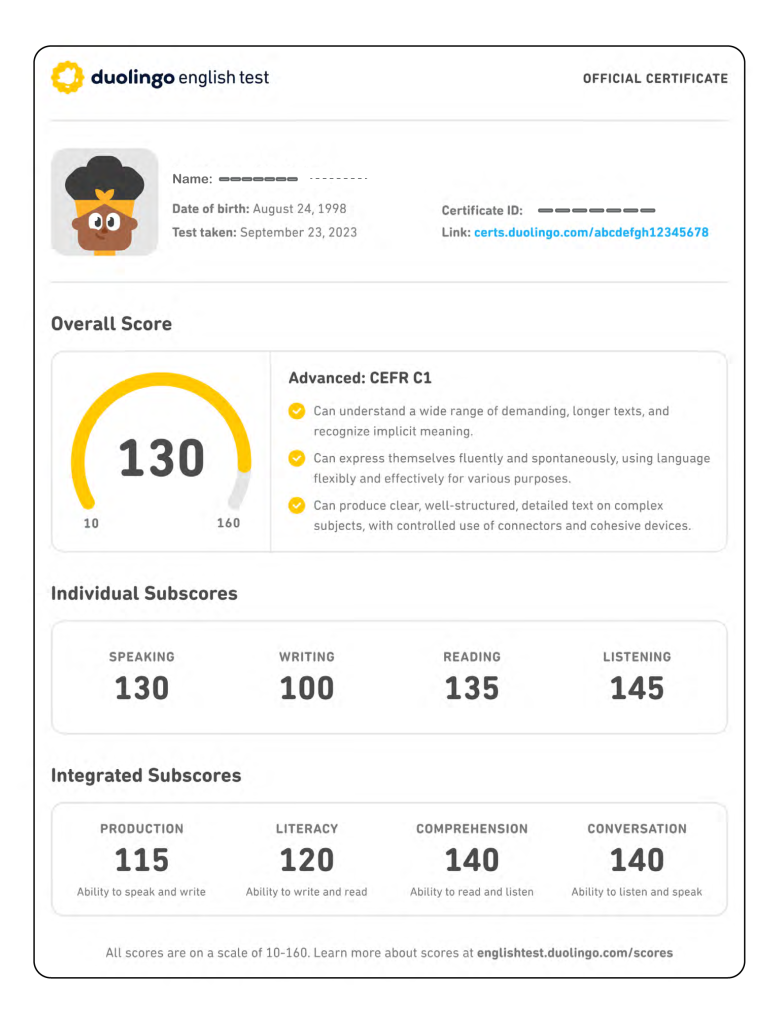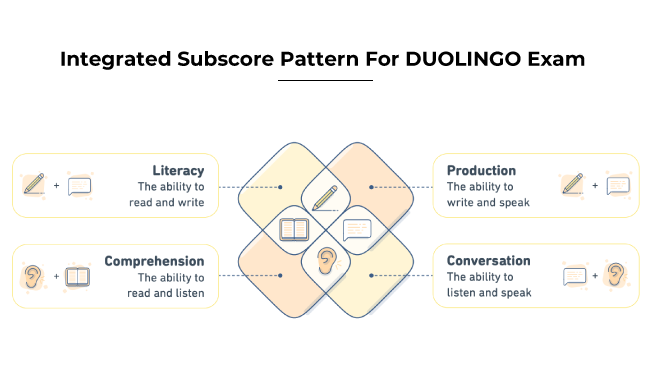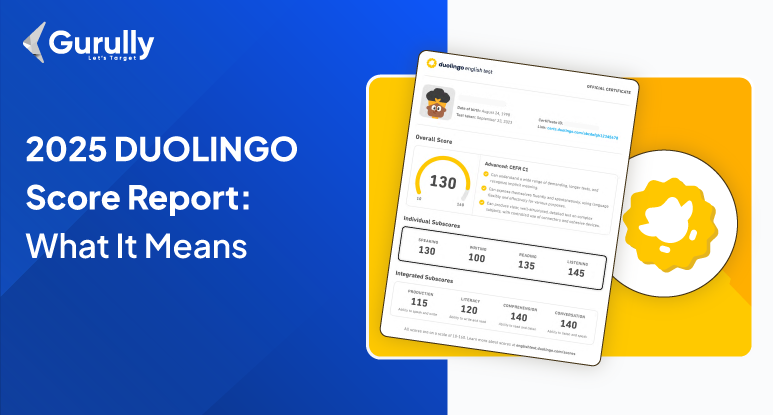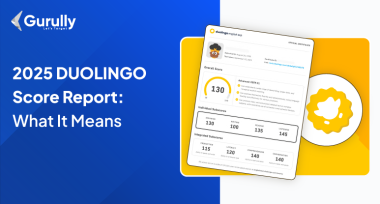Have you taken your DUOLINGO English Test (DET)? Congratulations! Now comes the wait for your results, but don’t worry; it’s a quick turnaround. Within 48 hours, you’ll have your result for DUOLINGO. But what does it all mean? No worries. Here is a detailed guide to the Duolingo English Test Scores report. Explore the new scoring system, interpret subscores, and use this information to your advantage.
Understanding the Duolingo English Test Scores
The Duolingo English Test is a one-hour online assessment designed to evaluate your English language proficiency in real-life scenarios. Unlike traditional tests, the Duolingo English Test can be taken from the comfort of your home, using any device with an internet connection. The test measures your ability to understand, read, write, and speak English, providing a comprehensive evaluation of your language skills. The Duolingo English test scores result are reported on a scale of 10 to 160, aligning with the Common European Framework of Reference (CEFR) for languages, ensuring that your proficiency level is recognized globally.
Addition Of Individual Subscore In Duolingo English Test Scores:
As of July 1st, 2024, DUOLINGO introduced a significant update to its scoring system. The score crediting is more detailed. A two-tiered system offers a more detailed analysis of your English proficiency.
By evaluating speaking, writing, reading, and listening skills, this test offers a comprehensive picture of your language strengths and weaknesses. This allows you to identify areas for improvement and develop a well-rounded understanding of the language.
DUOLINGO Test Score Report – Duolingo Score Card
Your Duolingo English test scores report includes your total score and breakdowns by skill area.
Individual Subscores:
In your Duolingo score chart, you will receive separate scores for your speaking, writing, reading, and listening abilities. This granular breakdown helps pinpoint areas for improvement. For instance, a high score in writing indicates a strong command of grammar, vocabulary, and sentence structure.
Conversely, a lower score might suggest a need to focus on mechanics or clarity in written expression. Similarly, individual scores in listening and reading can help you understand if you struggle to comprehend accents or grasp complex written passages.

Pattern Of Integrated Subscores In Duolingo English Test Scores:
These combine the individual subscores into real-world communication categories like Literacy, Comprehension, Conversation, and Production. This offers a practical understanding of your overall communication skills. Let’s delve deeper into these integrated subscores:
- Literacy: This combines your writing and reading skills, assessing your ability to understand and produce written English. A strong literacy score indicates proficiency in written communication, which is essential for academic success.
- Comprehension: This focuses on your listening and reading skills, gauging how well you grasp spoken and written English. A high comprehension score suggests you can effectively follow lectures, participate in discussions, and understand written materials in an English-speaking environment.
- Conversation: This integrates your speaking and listening skills, evaluating your fluency and ability to hold conversations. A strong conversation score indicates that you can express yourself clearly and confidently in spoken English, which is important for social interaction and navigating everyday situations.
- Production: It combines your writing and speaking skills, assessing your ability to express yourself through written and spoken English effectively. A high production score means you can generate clear, concise, and grammatically correct written and spoken English, which is crucial for academic writing and presentations.
While the overall Duolingo score card still ranges from 10 to 160, these subscores in Duolingo English test score provide a deeper understanding of your strengths and weaknesses.

Duolingo English Test Scores Breakdown :
Your score report will include:
- Overall Score: This single score (10-160) offers a general understanding of your English proficiency.
- Subscores: As mentioned earlier, you’ll receive individual scores for speaking, writing, reading, and listening, along with the integrated subscores for Literacy, Comprehension, Conversation, and Production. Each subscore is likely presented on a similar scale (potentially 1-5 or 10-50).
- Score Calculation: Your overall score is calculated by averaging your scores on each skill area, rounded to the nearest 5. These individual scores come from averaging the two parts that comprise each skill section.
Comparison for CEFR Score vs. Duolingo Score Chart
| Duolingo Score | CEFR Level |
| 155 – 160 | C2 |
| 130 -150 | C1 |
| 100 – 125 | B2 |
| 60 – 95 | B1 |
| 10 – 55 | A2 – A1 |
CEFR Stands for Common European Framework of Reference for Languages by which institutes or colleges check your level for the English language. Duolingo exams have now been accepted in major University as English eligibility exam.
Read to know the minimum score requirement to set your target score.
What is a Good Duolingo English Test Score?
Determining what is a good Duolingo English test scores can vary depending on the institution or program you are applying to. Generally, many schools require scores around 115. In 2023, the average score among test-takers was 108. For a more detailed perspective, the 25th percentile score for Comprehension was 105, while the 75th percentile was 130. A score of 120 or above is considered excellent, showcasing a high level of proficiency. Scores between 110-119 are deemed good, indicating strong language skills. If your score is below 90, you might need additional language support or preparation to meet the required standards.
How to book your Duolingo English Test exam?
Bonus DUOLINGO Preparation Tips
- Use a variety of sentence structures and different words to demonstrate your English fluency.
- Provide longer answers (more than 50 words written or 30 seconds spoken) as long as they’re relevant and well-written. This shows your ability to use English effectively.
- Be Clear: Speak loudly and at a moderate pace so the test can understand you.
- Keep Going: Don’t worry about minor mistakes; just finish your thoughts. You can’t re-record.
- Double-check: Don’t submit your recording until you’ve finished your entire response.
- Take Your Time: Focus on accuracy, not speed. You won’t get points for being fast.
- Proofread: Before submitting a written answer, take a moment to review for any typos or errors. Remember, you can’t go back later.
- Don’t Panic About Time: There’s a timer, but glancing at it constantly can be distracting. Leave some time at the end to double-check your work.
- Expand your English Horizons: Dive into blogs, social media, and online groups buzzing with English conversations. Immerse yourself in everyday English and discover new ways to express yourself.
- Stay Informed & Improve: Tackle news articles and current events in English. Use your existing knowledge of the world to unlock a deeper understanding of the content and boost your reading comprehension.
After learning the DUOLINGO test score, you must know how to practice for the DET exam. Gurully goes beyond basic practice by giving you a realistic testing environment. Our platform features simulated exams with authentic questions that mirror the actual DET. This gives you a strategic advantage by letting you experience the exact format and question styles you’ll encounter on test day. With Gurully, you can pinpoint your weaknesses and boost your confidence.
Conclusion:
The new Duolingo English test scores system introduced in July 2024 offers a two-tiered analysis. Your overall score (10-160) provides a general view, while individual and integrated subscores give a more granular picture.
Individual subscores assess your speaking, writing, reading, and listening strengths. For instance, a high score in writing indicates strong grammar and vocabulary. Conversely, a lower score might suggest areas for improvement. Integrated subscores like Literacy and Conversation combine these individual scores to showcase your practical communication abilities.
This detailed report empowers you to identify areas for improvement and develop a well-rounded understanding of your English proficiency. With focused practice and the bonus tips provided, you can effectively utilize your DET results to achieve your academic or professional goals.
Also Read:








